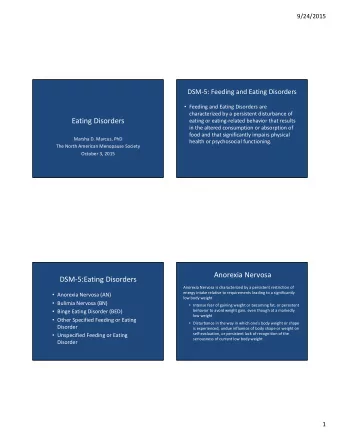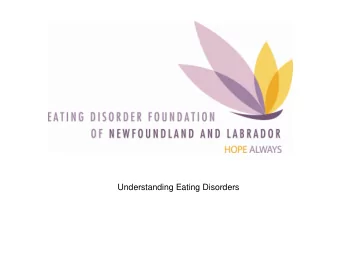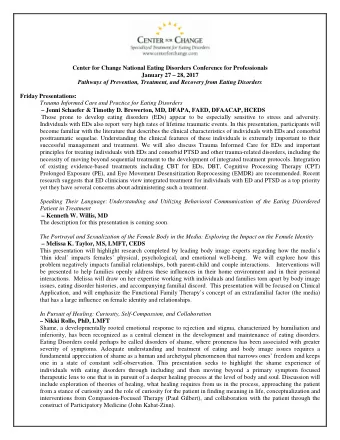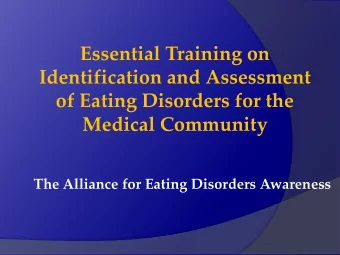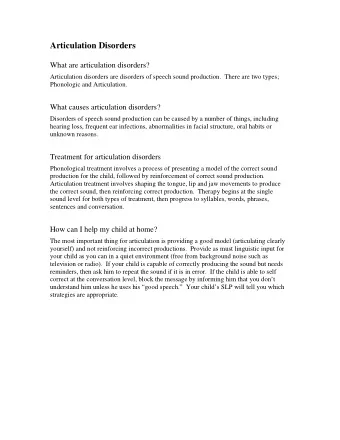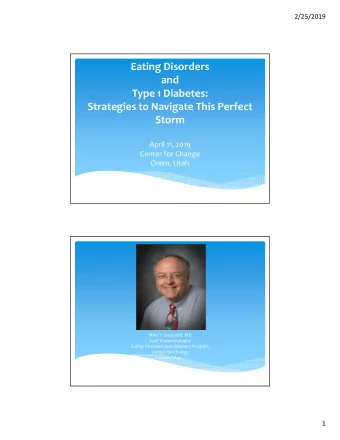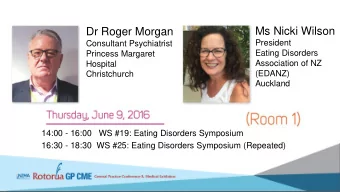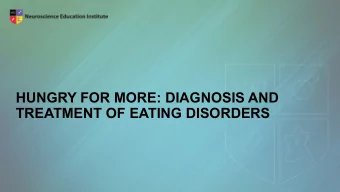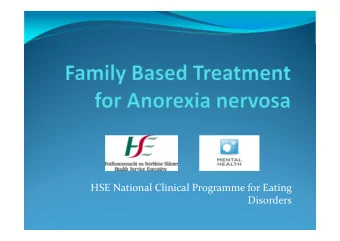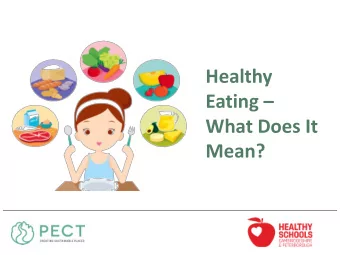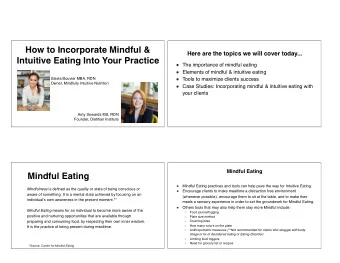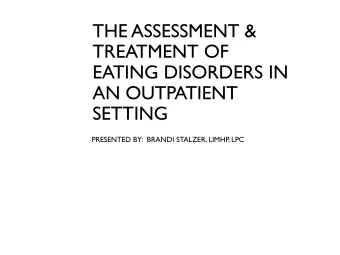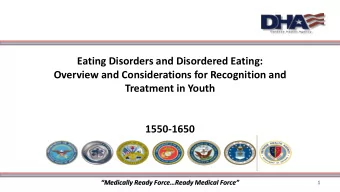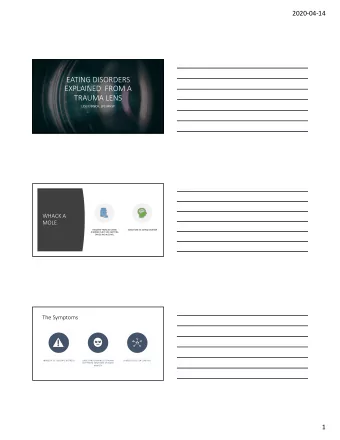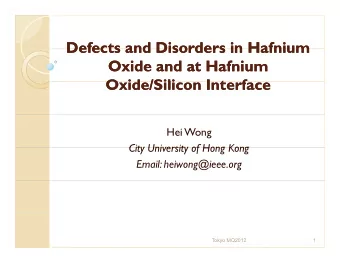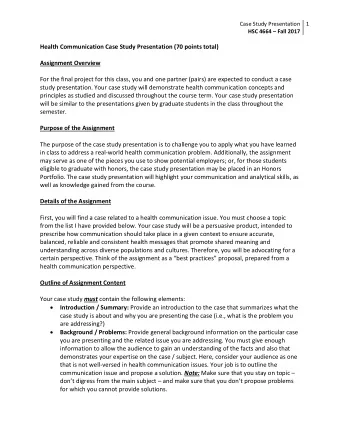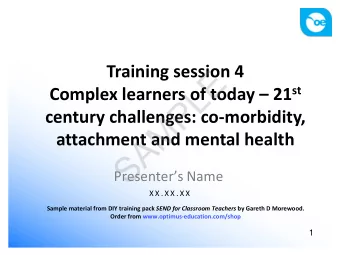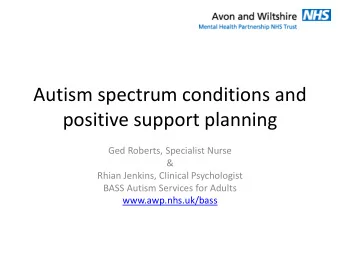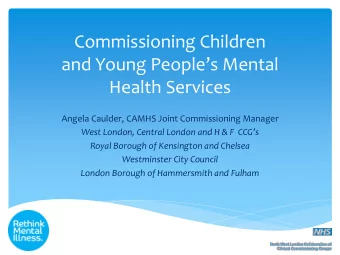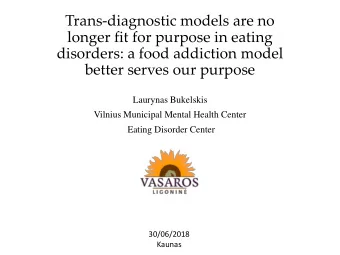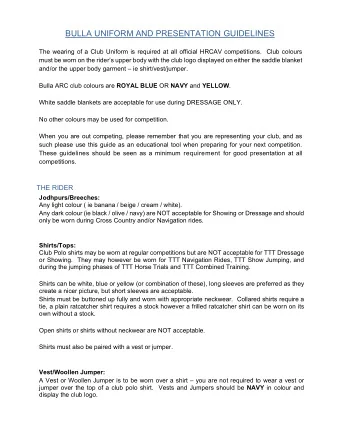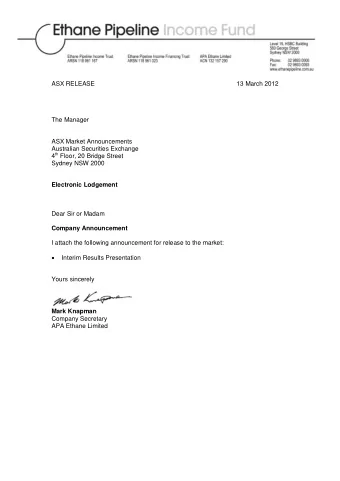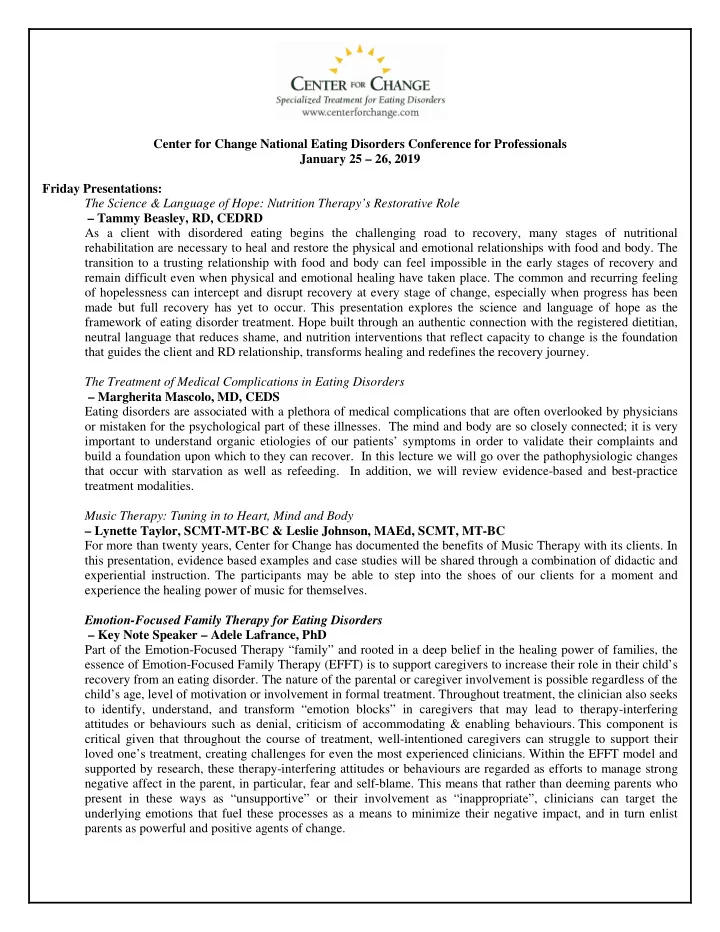
Center for Change National Eating Disorders Conference for - PDF document
Center for Change National Eating Disorders Conference for Professionals January 25 26, 2019 Friday Presentations: The Science & Language of Hope: Nutrition Therapys Restorative Role Tammy Beasley, RD, CEDRD As a client with
Center for Change National Eating Disorders Conference for Professionals January 25 – 26, 2019 Friday Presentations: The Science & Language of Hope: Nutrition Therapy’s Restorative Role – Tammy Beasley, RD, CEDRD As a client with disordered eating begins the challenging road to recovery, many stages of nutritional rehabilitation are necessary to heal and restore the physical and emotional relationships with food and body. The transition to a trusting relationship with food and body can feel impossible in the early stages of recovery and remain difficult even when physical and emotional healing have taken place. The common and recurring feeling of hopelessness can intercept and disrupt recovery at every stage of change, especially when progress has been made but full recovery has yet to occur. This presentation explores the science and language of hope as the framework of eating disorder treatment. Hope built through an authentic connection with the registered dietitian, neutral language that reduces shame, and nutrition interventions that reflect capacity to change is the foundation that guides the client and RD relationship, transforms healing and redefines the recovery journey. The Treatment of Medical Complications in Eating Disorders – Margherita Mascolo, MD, CEDS Eating disorders are associated with a plethora of medical complications that are often overlooked by physicians or mistaken for the psychological part of these illnesses. The mind and body are so closely connected; it is very important to understand organic etiologies of our patients’ symptoms in order to validate their complaints and build a foundation upon which to they can recover. In this lecture we will go over the pathophysiologic changes that occur with starvation as well as refeeding. In addition, we will review evidence-based and best-practice treatment modalities. Music Therapy: Tuning in to Heart, Mind and Body – Lynette Taylor, SCMT-MT-BC & Leslie Johnson, MAEd, SCMT, MT-BC For more than twenty years, Center for Change has documented the benefits of Music Therapy with its clients. In this presentation, evidence based examples and case studies will be shared through a combination of didactic and experiential instruction. The participants may be able to step into the shoes of our clients for a moment and experience the healing power of music for themselves. Emotion-Focused Family Therapy for Eating Disorders – Key Note Speaker – Adele Lafrance, PhD Part of the Emotion-Focused Therapy “family” and rooted in a deep belief in the healing power of families, the essence of Emotion-Focused Family Therapy (EFFT) is to support caregivers to increase their role in their child’s recovery from an eating disorder. The nature of the parental or caregiver involvement is possible regardless of the child’s age, level of motivation or involvement in formal treatment. Throughout treatment, the clinician also seeks to identify, understand, and transform “emotion blocks” in caregivers that may lead to therapy-interfering attitudes or behaviours such as denial, criticism of accommodating & enabling behaviours. This component is critical given that throughout the course of treatment, well-intentioned caregivers can struggle to support their loved one’s treatment, creating challenges for even the most experienced clinicians. Within the EFFT model and supported by research, these therapy-interfering attitudes or behaviours are regarded as efforts to manage strong negative affect in the parent, in particular, fear and self-blame. This means that rather than deeming parents who present in these ways as “unsupportive” or their involvement as “inappropriate”, clinicians can target the underlying emotions that fuel these processes as a means to minimize their negative impact, and in turn enlist parents as powerful and positive agents of change.
Center for Change National Eating Disorders Conference for Professionals January 26 – 27, 2018 Saturday Presentations: Orthorexia Nervosa: Pathologically Healthful Eating vs. Pathologizing Healthy Habits – Nicole Hawkins, PhD, CEDS This presentation will detail the evolution of Orthorexia Nervosa from the musings of a physician in the US to the work by Italian researchers to classify those suffering from the condition. Despite methodological flaws, a burgeoning literature has developed about this condition. The current state of the scholarship in ON will be discussed, particularly best estimates of prevalence, original research regarding the ability to detect the condition, and whether ON is deserving its own diagnostic entry in such classification systems as the DSM-5. Diagnostic criteria, case studies, the relationship of ON to AFID and treatment will be addressed. The Power of Pleasure: Embracing the Joy of Eating Well – April N. Hackert, MS, RDN, CEDRD Eating disorder treatment demands a conscious surrender of ones’ fixation of food. Yet, neurochemical reward mechanisms triggered from the consumption of food remain unexplored as a tool for redefining maladaptive attachments to this life-giving fuel. This session will be aimed at offering clinical and practical tools to support a client in using food to embrace their individual creativity through conscious food decisions each day. Furthermore, the willingness to use food as a tool for self-care rather than something to control accelerates the healing journey. The Path to Recovery: Best Practices for Provider-Patient Communication – Quinn Nystrom, M.S. This session addresses the key role of health care professionals and their use of effective communication tools for their patients. Medical professionals will learn how to sharpen the message they need to deliver to their patients for better health outcomes. Nystrom herself was diagnosed with type 1 diabetes at the age of 13 and struggled in silence with ED-DMT1 for 11 years before getting treatment for her eating disorder. Through her personal and professional experience, and graduate school research, you’ll learn the five best communication tips when talking to patients to increase their self-efficacy. The Secret Sauce of Psychotherapy – Michael E. Berrett, PhD, CEDS Over the course of their careers, clinicians acquire knowledge, learn from clients, hone skills, and become “seasoned” in their practices. These unique blends of experience, specialization, and intuitive intervention become the “secret sauce” of their psychotherapy. In this workshop, one seasoned clinician with 37 years of experience will provide his special recipe for therapeutic engagement and success. Dr. Berrett will illuminate the neurobiology of intuition, making treatment experiential, reclamation of spiritual identity, the importance of listening to heart, and other themes, principles, and interventions which are foundation stones of a healing process. Research on Clinical Outcome and ingredients of successful psychotherapy and helping participants clarify their own “secret sauce” will also be addressed. This workshop will be didactic, self-reflective, interactive, and experiential.
Recommend
More recommend
Explore More Topics
Stay informed with curated content and fresh updates.
